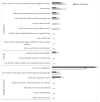Relatives from Hereditary Breast and Ovarian Cancer and Lynch Syndrome Families Forgoing Genetic Testing: Findings from the Swiss CASCADE Cohort
- PMID: 36294879
- PMCID: PMC9605198
- DOI: 10.3390/jpm12101740
Relatives from Hereditary Breast and Ovarian Cancer and Lynch Syndrome Families Forgoing Genetic Testing: Findings from the Swiss CASCADE Cohort
Abstract
Cascade genetic testing of relatives from families with pathogenic variants associated with hereditary breast and ovarian cancer (HBOC) or Lynch syndrome (LS) has important implications for cancer prevention. We compared the characteristics of relatives from HBOC or LS families who did not have genetic testing (GT (-) group) with those who had genetic testing (GT (+) group), regardless of the outcome. Self-administered surveys collected cross-sectional data between September 2017 and December 2021 from relatives participating in the CASCADE cohort. We used multivariable logistic regression with LASSO variable selection. Among n = 115 relatives who completed the baseline survey, 38% (n = 44) were in the GT (-) group. Being male (OR: 2.79, 95% CI: 1.10-7.10) and without a previous cancer diagnosis (OR: 4.47, 95% CI: 1.03-19.42) increased the odds of being untested by almost three times. Individuals from families with fewer tested relatives had 29% higher odds of being untested (OR: 0.71, 95% CI: 0.55-0.92). Reasons for forgoing cascade testing were: lack of provider recommendation, lack of time and interest in testing, being afraid of discrimination, and high out-of-pocket costs. Multilevel interventions designed to increase awareness about clinical implications of HBOC and LS in males, referrals from non-specialists, and support for testing multiple family members could improve the uptake of cascade testing.
Keywords: HBOC; barriers to genetic care; cascade genetic screening; healthcare system; relatives.
Conflict of interest statement
The authors do not have any conflict of interest.
Figures



Similar articles
-
Intention to Inform Relatives, Rates of Cascade Testing, and Preference for Patient-Mediated Communication in Families Concerned with Hereditary Breast and Ovarian Cancer and Lynch Syndrome: The Swiss CASCADE Cohort.Cancers (Basel). 2022 Mar 23;14(7):1636. doi: 10.3390/cancers14071636. Cancers (Basel). 2022. PMID: 35406409 Free PMC article.
-
Cancer Predisposition Cascade Screening for Hereditary Breast/Ovarian Cancer and Lynch Syndromes in Switzerland: Study Protocol.JMIR Res Protoc. 2017 Sep 20;6(9):e184. doi: 10.2196/resprot.8138. JMIR Res Protoc. 2017. PMID: 28931501 Free PMC article.
-
Using a Tailored Digital Health Intervention for Family Communication and Cascade Genetic Testing in Swiss and Korean Families With Hereditary Breast and Ovarian Cancer: Protocol for the DIALOGUE Study.JMIR Res Protoc. 2021 Jun 11;10(6):e26264. doi: 10.2196/26264. JMIR Res Protoc. 2021. PMID: 34114954 Free PMC article.
-
The uptake of presymptomatic genetic testing in hereditary breast-ovarian cancer and Lynch syndrome: a systematic review of the literature and implications for clinical practice.Fam Cancer. 2019 Jan;18(1):127-135. doi: 10.1007/s10689-018-0089-z. Fam Cancer. 2019. PMID: 29846880
-
Interventions Facilitating Family Communication of Genetic Testing Results and Cascade Screening in Hereditary Breast/Ovarian Cancer or Lynch Syndrome: A Systematic Review and Meta-Analysis.Cancers (Basel). 2021 Feb 23;13(4):925. doi: 10.3390/cancers13040925. Cancers (Basel). 2021. PMID: 33672149 Free PMC article. Review.
Cited by
-
Special Issue: "Genetic Counseling and Genetic Testing in Precision Medicine".J Pers Med. 2023 Jul 27;13(8):1192. doi: 10.3390/jpm13081192. J Pers Med. 2023. PMID: 37623443 Free PMC article.
-
Privacy and utility of genetic testing in families with hereditary cancer syndromes living in three countries: the international cascade genetic screening experience.Front Genet. 2023 May 9;14:1109431. doi: 10.3389/fgene.2023.1109431. eCollection 2023. Front Genet. 2023. PMID: 37229185 Free PMC article.
-
Streamlined Genetic Education and Cascade Testing in Men from Hereditary Breast Ovarian Cancer Families: A Randomized Trial.Public Health Genomics. 2024;27(1):100-109. doi: 10.1159/000540466. Epub 2024 Aug 22. Public Health Genomics. 2024. PMID: 39173603 Free PMC article. Clinical Trial.
-
Lynch syndrome in Mexican-Mestizo families: Genotype, phenotypes, and challenges in cascade testing among relatives at risk.Heliyon. 2024 May 24;10(11):e31855. doi: 10.1016/j.heliyon.2024.e31855. eCollection 2024 Jun 15. Heliyon. 2024. PMID: 38947473 Free PMC article.
-
Psychosocial Factors Involved in Genetic Testing for Rare Diseases: A Scoping Review.Genes (Basel). 2025 May 22;16(6):614. doi: 10.3390/genes16060614. Genes (Basel). 2025. PMID: 40565506 Free PMC article.
References
-
- Cancer Country Profile 2020: Switzerland. 2020. [(accessed on 1 October 2022)]. Available online: https://cdn.who.int/media/docs/default-source/country-profiles/cancer/ch....
-
- Swiss Cancer Report 2021: Rise in Number of Cancer Patients Coincides with Decline in Mortality. 2021. [(accessed on 1 October 2022)]. Available online: https://www.admin.ch/gov/en/start/documentation/media-releases.msg-id-85....
Grants and funding
LinkOut - more resources
Full Text Sources
Miscellaneous

